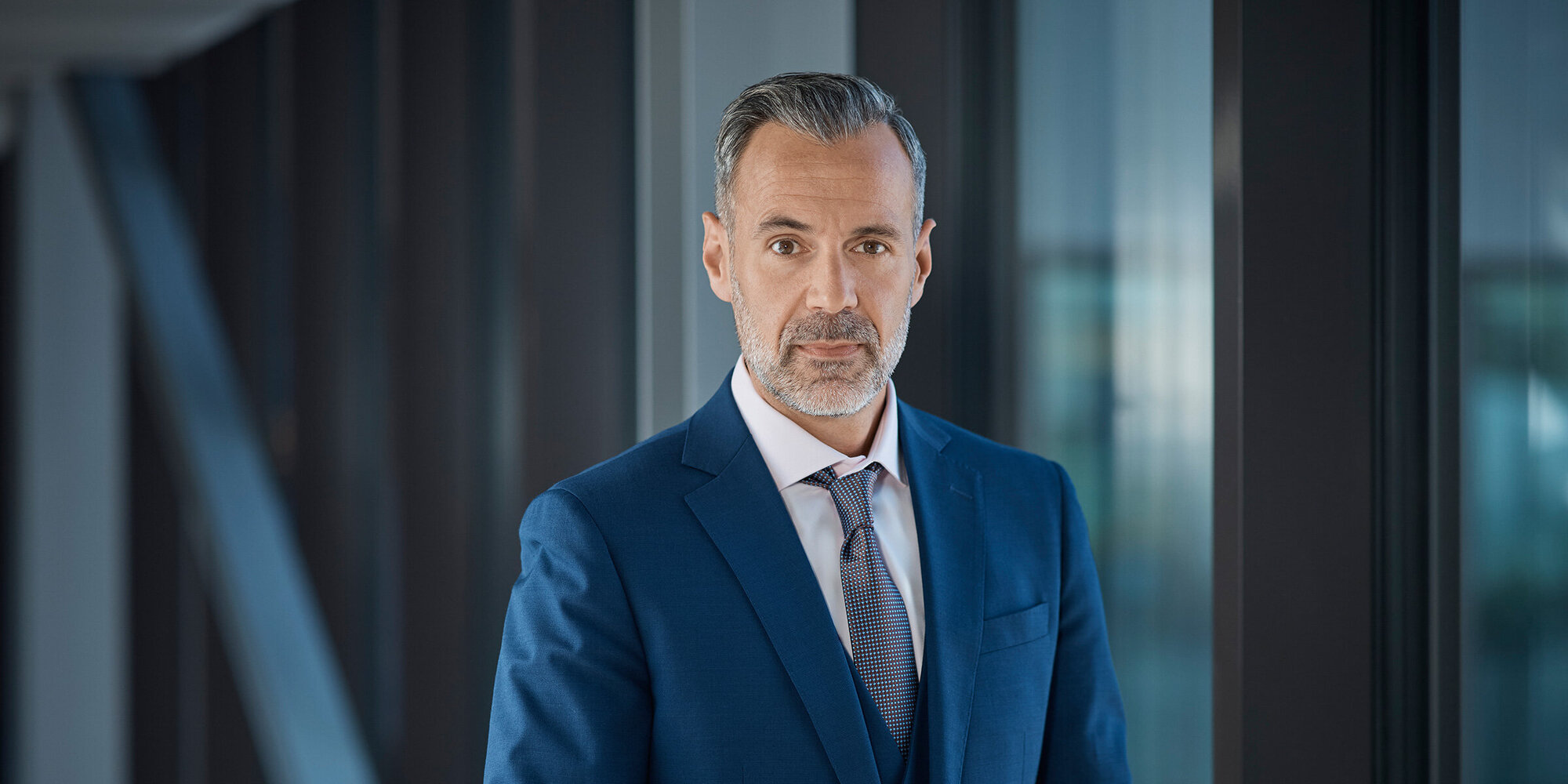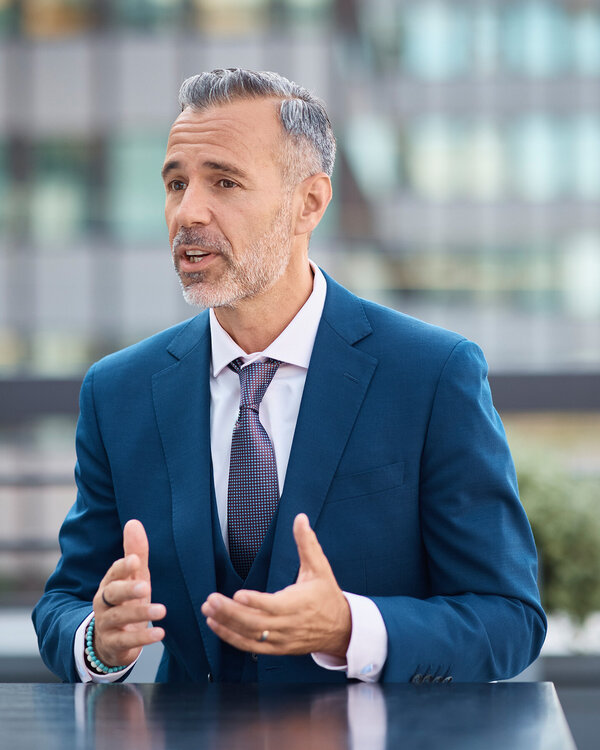René Nicolodi: «Thematic investments are a tradition for us»
We are launching three sustainable thematic funds in one go. René Nicolodi, Head of Equity & Themes, points to the many years of expertise behind the brand new products. And he explains what they have to deliver.

René, the slogan of the new sustainable theme funds is 'Why not invest in the future? We ask back: Why is Swisscanto launching these products - and why now?
The launch marks the logical expansion of our asset management expertise with sustainable thematic funds. That is our long-standing expertise. On the investment side, we have been dealing with sustainability, which remains of central importance to us beyond fashion trends, for almost three decades. The current ‘Earth Night’, an initiative against light pollution that marks the start of our campaign emphasises the importance of the sustainable approach.
In total, no fewer than three new thematic funds are being launched. They are dedicated to three major challenges that will continue to occupy humanity for generations to come: These are, firstly, the hope of a healthy long life, secondly, the more careful use of resources and, finally, the trend towards digitalisation. Why are these also attractive investment themes?
In our opinion, the investment themes addressed by the Swisscanto theme funds can benefit from long-term, structural growth drivers and enjoy a political tailwind. This in turn can act as a catalyst for investments. The demand is likely to be enormous, as the example of digitalisation alone shows: According to some industry experts, spending on IT could double in the next ten years. With our thematic funds, we want to actively invest in companies that can benefit disproportionately from these developments.
The sustainability aspect plays an important role in these funds. Why?
In our opinion, companies that align their products and services with sustainable challenges at an early stage - such as climate protection - enjoy a strategic advantage and can benefit from strong demand due to their contribution to finding solutions. This means that the investment strategies also fulfil the primary objective of achieving a financially attractive return and thus creating added value for investors. With this in mind, our thematic funds focus on selected companies that make a significant contribution to achieving the United Nations Sustainable Development Goals.

Rather, the risk lies in not being invested in the opportunities of the digital economy.
René Nicolodi, Head of Equity & Themes
Most people want good health and well-being in old age - this is also a sustainable development goal of the United Nations. This desire creates business opportunities: do the economic opportunities of longevity lie solely in the ‘silver economy’ and services for older people?
No, longevity is a cross-generational issue. The need for wellbeing also seems to be growing among younger people; consequently, disease prevention, for example, is an important part of the investment focus of our new thematic fund. Of course, structural solutions are also needed to counter demographic change. We believe there is much to be gained from this: Healthy longevity can be seen as one of the largest untapped growth markets.
The investment theme of the circular economy directly addresses the problems of our throwaway society. What is the potential here?
The circular economy aims to break with today's linear business practices, with which the economy is heading directly towards an enormous excess demand for available resources. The principle of the four Rs - ‘Reduce, Recycle, Reuse, Replace’ - is seen as a counter-concept to the waste of resources. This paradigm shift has been attributed a cross-sector growth potential of USD 4.5 trillion by the year 2030 by the consulting firm Accenture, for example. Some of this is already well underway and investable.
Finally, digitalisation is often said to have a disruptive, destructive power. Does this not make the topic particularly risky, also from an investor's perspective?
The ongoing digitalisation, with or without the contribution of artificial intelligence, is a key element of structural change in the economy and society. Rather, the risk lies in not being invested in the opportunities of the digital economy. This is because the transformation fuelled by digitalisation can act as a driver of economic prosperity and help new business models and innovative services and products to achieve a breakthrough. This engine no longer only drives the technology sector but affects practically all economic sectors and areas of life. Digital solutions and telecommunications can also have an integrating effect: For example, in education or access to healthcare and financial services. Digital solutions can also help to overcome environmental challenges. For example, the negative environmental impact of agriculture can be reduced thanks to digital solutions.
Thematic funds at a glance
Which of the themes played by the new funds concerns you personally the most?
I am interested in all themes on a personal level, especially with regard to their impact on society and the economy. At the same time, I find it particularly remarkable that although the individual topics address very different challenges, they are also strongly interlinked. For example, the fight against climate change is hardly conceivable without the tools of the digital economy. Nor is the careful use of water resources without the principle of the circular economy. From an investor's perspective, the characteristics of the individual themes are also interesting: the funds can be used as building blocks that complement each other in a global equity portfolio.
Profit-oriented investors sometimes fear that they will have to sacrifice returns for the sake of sustainability. Is this justified?
Again, funds must add value for investors. This is true for both sustainable and non-sustainable investment strategies. Our aim is to outperform the benchmark index by selecting sustainable thematic securities and focussing on quality criteria. This is particularly relevant for thematic investment strategies. Simply focussing on growth is not enough. Only if it is profitable can it also create financial added value, which is reflected in rising company values.
The global sustainable investment strategy now manages over CHF 5 billion.
René Nicolodi, Head of Equity & Themes
From an investor's perspective, an asset manager's track record is key. Is this a handicap for brand new funds?
We have a tradition of sustainable thematic investments. Zürcher Kantonalbank has been conducting sustainability research since 1996. In Asset Management, we launched the first sustainable investment fund in 1998; the global sustainable investment strategy now manages over CHF 5 billion. Our expertise in the existing thematic funds Water and Climate has been in place for 17 years.
With which customers would Swisscanto like to score points with these arguments?
The primary focus is on our wholesale partners in Switzerland and on the customers abroad served by our subsidiaries. In general, Swisscanto thematic funds appeal to an investor base that has recognised the importance and long-term opportunities of investment themes in the portfolio context. A broad horizon is important here: the funds are orientated towards developments that take place over decades and have a global impact.
The potential demand will not only come from Zurich, right?
We want to appeal to customers from all over Switzerland, but also to clients abroad through our subsidiaries, for example in Germany and Italy, where we now have local sales teams in Frankfurt and Milan. Whether near or far, the same applies to all investors: the assets of the thematic funds are managed exclusively in Switzerland. The investment strategy combines fundamental, quantitative and sustainable analyses.
Now that the launch has been completed, is there time to take a deep breath? Or is Zürcher Kantonalbank Asset Management already planning the next themed funds?
The real work is only just beginning. After all, the new thematic funds have to prove themselves both on the market and with our clients. Meanwhile, we are not standing still and continue working on our product pipeline.



